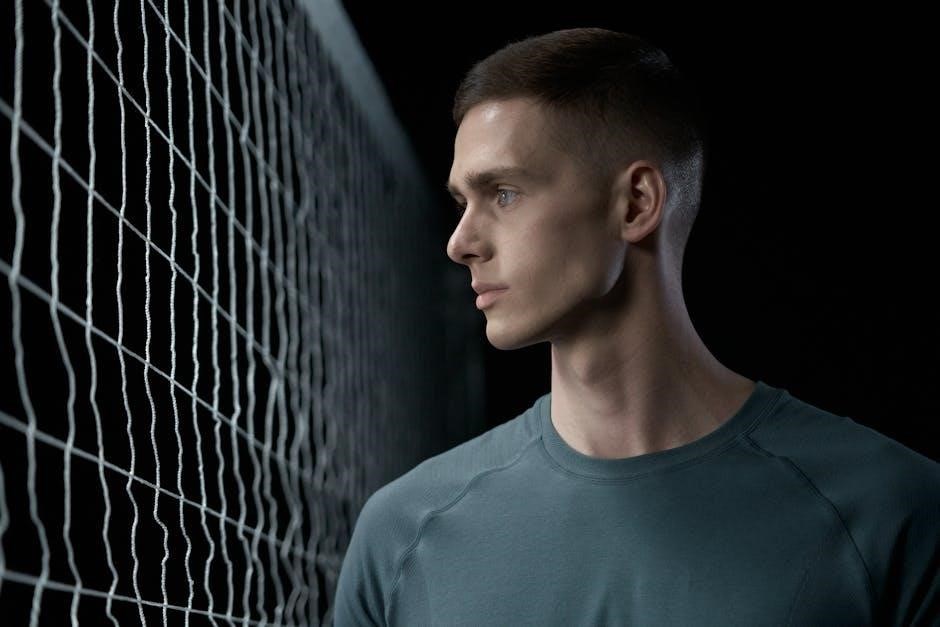The thoughtful pursuit of strength is a holistic approach blending physical discipline with mental focus, emphasizing intentional movement and mindfulness to achieve sustainable progress and overall well-being.

1.1 Understanding the Concept of Thoughtful Strength Training
Thoughtful strength training is a method that combines intentional movement with mindfulness, focusing on long-term progress rather than short-term gains. It emphasizes understanding the body’s capabilities and limitations, ensuring each exercise is performed with purpose and precision. This approach prioritizes quality over quantity, fostering a deeper connection between the mind and body. By integrating breathing techniques and mindful awareness, it enhances focus and reduces the risk of injury. The goal is to create a sustainable training model that promotes strength, resilience, and overall well-being, making it accessible to both experienced athletes and beginners. This mindful approach ensures that strength development is not just physical but also mentally and emotionally enriching.
1.2 The Importance of Mindfulness in Strength Development
Mindfulness is a cornerstone of thoughtful strength development, allowing individuals to cultivate awareness and intention during training. By focusing on the present moment, lifters can optimize their form, maximize muscle engagement, and enhance overall performance. Mindfulness reduces mental distractions, fostering a deeper connection between the mind and body. This heightened awareness not only improves technique but also reduces the risk of injury. Additionally, mindfulness practices, such as controlled breathing and meditation, can improve recovery and mental fortitude. Over time, this approach builds resilience, helping individuals overcome plateaus and maintain consistent progress. The integration of mindfulness transforms strength training into a holistic practice, benefiting both physical and mental well-being.

The Author and His Approach
Chad Wesley Smith, founder of Juggernaut Training Systems, is a renowned strength athlete and coach. His approach combines physical prowess with mental discipline, fostering holistic development.
2.1 Chad Wesley Smith: Background and Achievements
Chad Wesley Smith, a prominent figure in strength training, transitioned from track and field to powerlifting and strongman, earning multiple collegiate national championships. With a background in athletic competition, Smith founded Juggernaut Training Systems, becoming a respected coach and author. His achievements span competitive success, educational contributions, and inspiring countless athletes. Smith’s work emphasizes the integration of physical and mental disciplines, reflecting his holistic approach to strength development.
2.2 The Philosophy Behind Juggernaut Training Systems
Juggernaut Training Systems, founded by Chad Wesley Smith, is rooted in a philosophy that combines mindful strength training with intentional movement and recovery. The system emphasizes the integration of physical and mental disciplines, fostering a holistic approach to strength development. By focusing on progressive overload and deliberate practice, Juggernaut Training Systems aims to help athletes achieve sustainable progress and long-term success. The philosophy underscores the importance of consistency, patience, and a positive mindset, creating a comprehensive framework for strength pursuit that extends beyond traditional training methods.
Practical Techniques for Mindful Strength Training
Mindful strength training involves techniques like breathing exercises, progressive overload, and recovery-focused routines to enhance focus, ensure intentional movement, and promote sustainable physical and mental growth.
3.1 Breathing Exercises for Enhanced Focus
Breathing exercises are fundamental to mindful strength training, helping athletes maintain focus and composure under stress. Techniques like box breathing—inhale for 4 seconds, hold for 4, exhale for 4, and hold again—promote mental clarity. By synchronizing breath with movement, lifters can enhance concentration, ensuring precise and intentional actions. Proper breathing also optimizes physical performance by stabilizing the core and improving oxygen flow to muscles. This practice, emphasized in the Thoughtful Pursuit of Strength, reduces stress and improves mind-body connection, fostering a disciplined and resilient training mindset. Regular incorporation of breathing exercises cultivates awareness, allowing athletes to perform at their best while maintaining long-term physical and mental well-being.
3.2 Progressive Overload with Intentional Movement
Progressive overload, a cornerstone of strength training, involves gradually increasing weight or resistance to challenge muscles and stimulate growth. When paired with intentional movement, it becomes a powerful tool for mindful strength development. Intentional movement emphasizes focus on form, muscle engagement, and controlled pacing, ensuring each rep is executed with purpose. This approach prevents injuries and maximizes progress. By combining progressive overload with mindfulness, athletes can better connect with their bodies, optimizing each lift. Chad Wesley Smith, founder of Juggernaut Training Systems, highlights this method in his work, advocating for a blend of intensity and awareness to foster sustainable strength gains and overall resilience. This holistic strategy ensures every workout contributes meaningfully to long-term goals.
3.3 The Role of Recovery in Strength Pursuit
Recovery is a critical yet often overlooked component of strength development. It allows the body to repair and adapt, ensuring sustainable progress. Adequate rest, nutrition, and stress management are essential for muscle repair and mental rejuvenation. Without proper recovery, athletes risk injury and stagnation. Chad Wesley Smith emphasizes the importance of balancing intense training with intentional recovery strategies. Techniques like sleep optimization, active recovery, and stress reduction are integral to his approach. Recovery not only enhances physical resilience but also strengthens mental fortitude, enabling athletes to maintain consistency and push through challenges. By prioritizing recovery, individuals can unlock their full potential and achieve long-term strength gains. This holistic perspective underscores the interplay between effort and restoration in the pursuit of strength.

Overcoming Plateaus and Mental Barriers
Breaking through plateaus requires strategic adjustments, mental resilience, and patience. Progressive overload, varied training, and mindset shifts help overcome physical and psychological obstacles, fostering sustained growth.
4.1 Identifying and Addressing Training Plateaus
Recognizing a plateau involves noticing stalled progress, decreased motivation, or lack of challenge in workouts; To address this, incorporate progressive overload, vary training methods, and focus on recovery. Periodization, deload phases, and mindfulness practices can reignite growth. Mental shifts, such as visualization and positive self-talk, enhance resilience. By combining strategic physical adjustments with mental fortitude, trainees can overcome plateaus and continue their journey toward strength and personal development.
- Signs of plateaus include stagnant performance and mental fatigue.
- Strategies like progressive overload and movement variation can help break through.
- Mental resilience and recovery play crucial roles in sustaining progress.

4.2 Building Mental Fortitude for Consistent Progress
Mental fortitude is essential for overcoming challenges and maintaining consistent progress in strength training. It involves cultivating resilience, discipline, and focus. Techniques like visualization, positive self-talk, and mindfulness can enhance mental toughness. Setting clear, achievable goals helps build confidence and perseverance. Embracing challenges as opportunities for growth fosters a resilient mindset. Consistent effort, paired with a growth mindset, strengthens mental resolve, enabling trainees to push through obstacles and maintain progress over time. By integrating these practices, individuals can develop the mental strength needed to sustain their pursuit of strength and achieve long-term success.
- Mental fortitude is built through consistent practice and resilience.
- Visualization and positive self-talk enhance mental toughness.
- Clear goals and a growth mindset drive persistent effort.
The Holistic Model of Strength Development
The holistic model of strength development combines physical training, mental focus, and emotional balance, ensuring sustainable progress and overall well-being through a balanced approach.
5.1 Integrating Physical, Mental, and Emotional Well-being
The holistic model emphasizes the interconnectedness of physical, mental, and emotional health in strength development. It advocates for a balanced approach where physical training is complemented by mindfulness practices, such as breathing exercises and recovery techniques, to foster resilience. Emotional well-being is addressed through goal setting and stress management, ensuring sustainability in the pursuit of strength. This integration creates a cohesive system where each aspect supports the others, leading to optimal performance and long-term progress. By nurturing the whole individual, the holistic model promotes not just physical strength but also mental fortitude and emotional stability, aligning with Chad Wesley Smith’s philosophy in Juggernaut Training Systems.
5.2 The Interplay Between Strength and Overall Health
Strength training is deeply intertwined with overall health, as it enhances physical resilience, improves mental clarity, and boosts emotional stability. A strong physique reduces the risk of injuries, supports better posture, and contributes to long-term health outcomes. The thoughtful pursuit of strength emphasizes sustainable progress, ensuring that physical gains align with mental and emotional well-being. By fostering a strong, healthy body, individuals can better navigate life’s challenges, maintaining vitality and energy. This approach highlights the transformative power of strength beyond mere physical achievement, creating a foundation for holistic health and longevity.